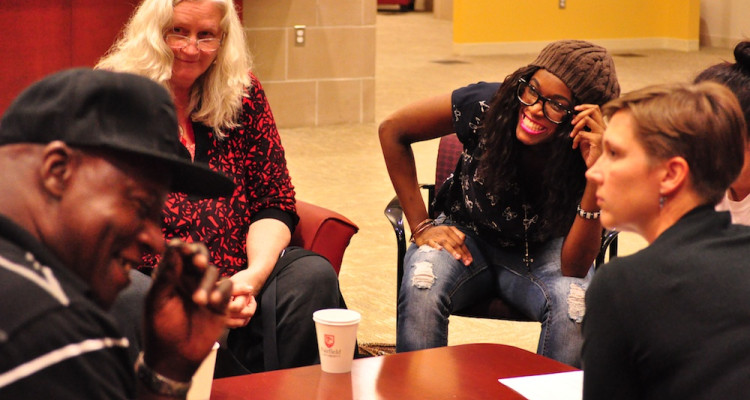For Rev. Dr. Anthony L. Bennet, the acquittal of George Zimmerman brought about feelings of vulnerability, anger and regret. “My reaction was both as an African-American male, a father and a pastor,” he said, “Specifically, the Zimmerman verdict opened an emotional scab.”
Bennet was on the panel at Fairfield’s “National Dialogue on Race Day” on Thursday held in the Kelley Center Presentation Room. He joined students and professors from Fairfield University, Fairfield College Preparatory School, and local residents to discuss issues regarding race.
Following the summer events of the Trayvon Martin case and the Supreme Court’s decision on the Voting Rights Act and Affirmative Action, Fairfield joined five other universities to celebrate “National Dialogue on Race Day” on Thursday. The dialogue, coordinated by chair of the history department and director of black studies at Fairfield, Dr. Yohuru Williams, united residents and students with one common goal: to discuss the issues regarding race.
“Tonight is a national dialogue… If you talk about race, you’re called a racist,” said Politics Professor Dr. Jocelyn Boryczka. “What we’re doing here is talking about the very things that make us what we are. That is what makes us a democratic nation.”
According to Williams, “Tonight is about dialogue and healing. We need to talk about how to move forward in terms of race relations and dialogue.” As groups were ready to discuss issues at their tables, the power went out at the Kelley Center, but Williams urged the conversation to continue. “During the Civil Rights Movement they met like this all of the time because they had to meet in private,” Williams said.
Using phones as flashlights, students and residents discussed their concerns about race, a topic that needs to be discussed  according to several participants. Paul Bernard of Bridgeport, whose son was on the panel, said, “We’ve had this dialogue a lot at home, especially after Zimmerman.” Through these talks, “hopefully we’re going to be more aware that there’s still a lingering problem,” Bernard added. “If you don’t talk about it, the feelings linger, and once you’re talking about it, the sentiments are not going to stay hidden.”
according to several participants. Paul Bernard of Bridgeport, whose son was on the panel, said, “We’ve had this dialogue a lot at home, especially after Zimmerman.” Through these talks, “hopefully we’re going to be more aware that there’s still a lingering problem,” Bernard added. “If you don’t talk about it, the feelings linger, and once you’re talking about it, the sentiments are not going to stay hidden.”
According to Doug Riden of Madison, the Zimmerman incident led to people becoming more racially aware. “I don’t understand it, and I’m trying to,” Riden said. “This is a great forum to talk about it … and we need this on a much bigger scale.”
For Brigid Callahan ’16, events like this one are important for discussing equality. “I really wanted to come because I’m passionately involved in advocacy programs on campus,” Callahan said. “I think issues of equality, among men and women and of different races, are really important to learn about.”
Junior Kaneez Anwar, a student on the panel, said, “Racism is systematic, structural and institutional.”
According to Rev. Dr. Bennet, we can overcome issues of racism and inequality by “look(ing) at the person who is different, not as a threat, but as someone who is made in the image of God, just like you.”
Williams assured Thursday’s participants that “we’re going to keep talking. We’re going to keep dialoguing.”
Fairfield plans to hold another dialogue next semester.


Leave a Reply